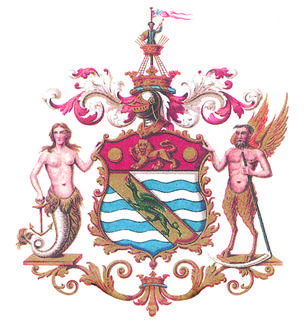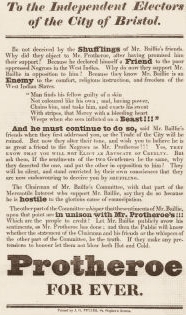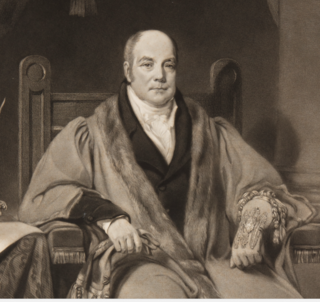Related Research Articles

Triangular trade or triangle trade is trade between three ports or regions. Triangular trade usually evolves when a region has export commodities that are not required in the region from which its major imports come. It has been used to offset trade imbalances between different regions.

The Society of Merchant Venturers is a charitable organisation in the English city of Bristol.

The Port of Bristol comprises the commercial, and former commercial, docks situated in and near the city of Bristol in England. The Port of Bristol Authority was the commercial title of the Bristol City, Avonmouth, Portishead and Royal Portbury Docks when they were operated by Bristol City Council, which ceased trade when the Avonmouth and Royal Portbury Docks were leased to The Bristol Port Company in 1991.
Caleb B. Gardner of Newport, Rhode Island, was an American slave trader and slavery oligarch. He was the owner or part share owner of more than a dozen slave trade vessels. On many voyages, he was also the Captain of the vessel.

Bristol, a port city in the South West of England, on the banks of the River Avon, has been an important location for maritime trade for centuries.

Philip Protheroe was an English ship captain and slave trader.
Isaac Hobhouse was an English slave trader, merchant, and member of the Society of Merchant Venturers. Based in Bristol, he was at the centre of money, trade, and credit and acquired much of his fortune through the trade and exploitation of African slaves in the 18th century.
John Dukinfield was a Bristol merchant and slave trader. Born 12 August 1677 in Bristol, he died in 1745. He had two brothers, Robert and William. A member of the family holding the Dukinfield baronetcy, he was a member of the Society of Merchant Venturers.
Abraham Hooke was a wealthy slave merchant from Bristol who participated in the Transatlantic Slave Trade from 1703 to 1736.
Walter Lougher was a merchant slave trader who became well known throughout the Bristol Area. He became a well and respected person among his peers and he participated in many slave voyages around the world.
Michael Becher was a Bristol-born English slave trader and merchant. Becher was from an established Bristol commercial family, and he took over his father's slave trading firm
Noblett Ruddock was a Bristol slave trader during the 18th century.
Walter Edward Minchinton, FRHistS was a British historian and academic. He was Professor of Economic History at the University of Exeter from 1964 to 1986.
African Queen's origins are uncertain. She was a foreign vessel, launched in 1789 or 1790, presumably under another name. She was taken in prize in 1796 and by 1797 she was sailing out of Bristol. She made one voyage to Africa during which she was captured and recaptured and then became a slave ship in the triangular trade in enslaved people. She made one voyage to the West Indies as a merchant ship, and one voyage as a whaler, but was damaged in 1801 as she returned home from that whaling voyage and apparently never sailed again.
William Challoner was a prominent English slave trader in the 18th century.

Thomas Daniel was a shipping magnate, financier and sugar merchant in Bristol and London. His omnipotence was such that he was known as the "King of Bristol" and in later life "The Father of Bristol" because of his family's power in corporate and political affairs for over 50 years.
Philip Freke was an English merchant involved in the slave trade and based in Bristol. Freke stood unsuccessfully as a tory candidate for the Bristol two seat constituency in the 1715 British general election.

Liverpool, a port city in north-west England, was involved in the transatlantic slave trade. The trade developed in the eighteenth century, as Liverpool slave traders were able to supply fabric from Manchester to the Caribbean islands at very competitive prices.
Lovely Lass was launched in France in 1780, almost surely under another name. She first appeared in British records in 1788. She made three voyages as a Bristol-based slave ship in the triangular trade in enslaved people. She then briefly became a West Indiaman before she became a Liverpool-based enslaving ship. She was lost in 1798 on her first voyage from Liverpool to gather captives.
Brothers was launched in the Thirteen Colonies in 1772, probably under another name. From 1785 she became a Bristol-based slave ship. She made six complete voyages in the triangular trade, in all embarking 1880 enslaved people. The French captured her in December 1794 as she was on the first leg of her seventh such voyage and before she had embarked any captives. The main source for this article provided detail on crew turnover and death rates for her first three voyages. The first voyage had a particularly heavy mortality rate among the crew. The main source also provided data for her fourth, fifth, and sixth voyages for mortality rates on the Middle Passage among the enslaved people that she was carrying.
References
- ↑ Minchinton, Walter E. (1957). The Trade of Bristol in the Eighteenth Century. Bristol Record Society.
- ↑ E., Minchinton, Walter (1984). Virginia slave-trade statistics, 1698-1775. King, Celia M. (Celia Mary), Waite, Peter B., Virginia State Library. Richmond: Virginia State Library. ISBN 0884901181. OCLC 10799029.
{{cite book}}: CS1 maint: multiple names: authors list (link) - ↑ Richardson, David (1987). Bristol, Africa and the Eighteenth-century Slave Trade to America: The years of ascendancy, 1730-1745. Bristol Record Society.
- ↑ "Voyage Information". www.slavevoyages.org. Retrieved 17 November 2017.
- ↑ "Search The Voyages Database". www.slavevoyages.org. Archived from the original on 11 March 2018. Retrieved 17 November 2017.
- ↑ Society of Merchant Ventures (1963). Politics And The Port of Bristol In The Eighteenth Century: The Petitions of the Society of Merchant Ventures 1698-1803. Bristol Record Society. p. 212.
- ↑ Latimer, John (1903). The History of the Society of Merchant Venturers of the City of Bristol: With Some Account of the Anterior Merchants' Guilds. J. W. Arrowsmith. p. 329.
henry dampier master of merchant ventures.
- ↑ Latimer, John (1893). The Annals of Bristol in the Eighteenth Century. author. p. 541.
Henry Dampier.
- ↑ "Search The Voyages Database". www.slavevoyages.org. Archived from the original on 11 March 2018. Retrieved 17 November 2017.